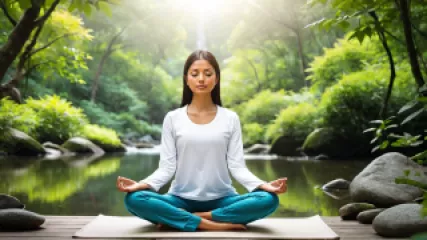Mindfulness vs Meditation: A Beginner's Guide
Mindfulness vs Meditation: A Beginner's Guide
Welcome to the beginner's guide to understanding the differences between mindfulness and meditation. In today's fast-paced world, where stress and anxiety are prevalent, many people are turning to practices that promote mental well-being and self-improvement. Mindfulness and meditation are two such practices that have gained popularity in recent years. While they may seem similar on the surface, they have distinct approaches and benefits. In this guide, we will explore what mindfulness and meditation are, their unique characteristics, and how you can incorporate them into your daily life.
What is Mindfulness?
Mindfulness is a state of being fully present and aware of the current moment without judgment. It involves intentionally paying attention to your thoughts, emotions, bodily sensations, and the environment around you. Mindfulness emphasizes acceptance and non-reactivity towards whatever arises in your experience.
Practicing mindfulness helps you develop a deep sense of self-awareness and an understanding of the mind-body connection. By observing your thoughts and feelings without attaching to them, you can cultivate a greater sense of calm, clarity, and compassion.
What is Meditation?
Meditation, on the other hand, is a systematic practice that involves training the mind to focus and redirect thoughts. It aims to cultivate specific qualities such as concentration, tranquility, and insight. Meditation techniques vary, but they often involve focusing attention on a particular object, such as the breath, a mantra, or a visual image.
Through regular meditation practice, you can develop a heightened level of self-awareness and an ability to observe your thoughts and emotions without getting caught up in them. This can lead to a greater sense of peace, improved emotional well-being, and a deeper understanding of yourself.
The Key Differences
While mindfulness and meditation share some similarities, there are key differences that set them apart:
1. Approach:
Mindfulness is an open and receptive awareness of the present moment, while meditation involves focused attention on a specific object or practice.
2. Purpose:
Mindfulness aims to cultivate an attitude of non-judgmental awareness in daily life, fostering a sense of acceptance and compassion. Meditation, on the other hand, aims to develop specific qualities such as concentration, tranquility, and insight.
3. Practice:
Mindfulness can be practiced informally throughout the day by paying attention to simple activities like eating, walking, or brushing your teeth. Meditation, however, typically involves setting aside dedicated time for formal practice, such as sitting or walking meditation.
4. Benefits:
Mindfulness practice can enhance overall well-being, reduce stress, improve focus, and promote emotional resilience. Meditation practice can deepen self-awareness, increase relaxation, boost cognitive function, and foster personal growth.
How to Incorporate Mindfulness and Meditation into Your Life
Now that you have a basic understanding of mindfulness and meditation, let's explore how you can incorporate these practices into your daily life:
1. Start Small:
Begin with just a few minutes of mindfulness or meditation practice each day and gradually increase the duration over time. Consistency is more important than the length of your practice.
2. Find a Quiet Space:
Choose a calm and quiet environment where you can minimize distractions and fully focus on your practice. This could be a designated meditation area in your home or a peaceful outdoor setting.
3. Set Realistic Expectations:
Approach mindfulness and meditation with an open mind and without judgment. It's normal for the mind to wander during practice; simply observe and gently bring your attention back to the present moment.
4. Explore Different Techniques:
Experiment with various mindfulness and meditation techniques to find what resonates with you. This could include breath awareness, body scan, loving-kindness meditation, or guided meditations.
5. Integrate Mindfulness into Daily Activities:
Practice informal mindfulness by bringing your full attention to everyday activities. Whether it's eating a meal, engaging in conversation, or going for a walk, make an effort to be fully present in the moment.
6. Seek Guidance:
If you're new to mindfulness and meditation, consider seeking guidance from a qualified teacher or joining a local group or class. They can offer support, guidance, and answer any questions you may have along the way.
The Power of Mindfulness and Meditation
Both mindfulness and meditation have the potential to transform your life by cultivating self-awareness, reducing stress, and improving overall well-being. By incorporating these practices into your daily routine, you can develop a deeper understanding of yourself, enhance your mental clarity, and foster a greater sense of peace and balance.
Remember, mindfulness and meditation are not quick fixes. Like any skill, they require regular practice and patience. As you embark on this journey, be kind and gentle with yourself. Celebrate small victories and embrace the process of self-discovery and growth.
So, whether you choose to explore mindfulness, meditation, or both, the most important thing is to start and stay committed to your practice. Your mental well-being and self-improvement are worth the effort.






